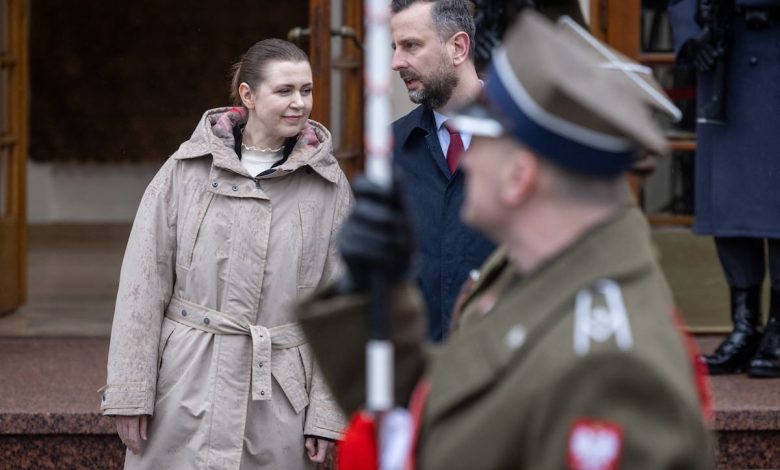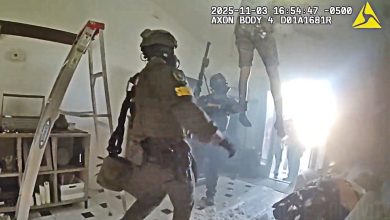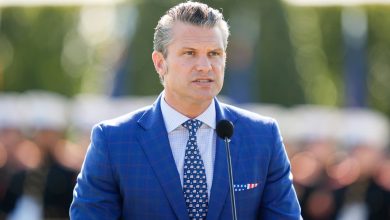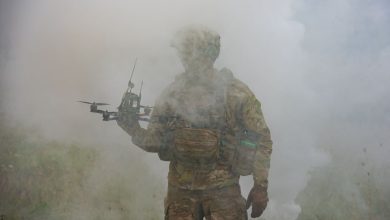Lithuania’s defense minister on reading Trump, the cruelty of mines

VILNIUS, Lithuania — Dovilė Šakalienė has been serving as the Lithuanian Minister of National Defense since 2024. Previously a psychologist, journalist and lawmaker, she has spearheaded a number of reforms within Lithuania’s security sector, including new legal amendments aimed at significantly shortening procedures for foreign defense companies to invest in the Baltic state.
She has been an advocate for raising the country’s defense spending, with plans to spend 5.25% of its gross domestic product on the military next year. The official has also placed a key importance on supporting Ukraine, where in 2025 Lithuania’s pledged commitments to the war-torn country are worth approximately €110 million ($124 million), a number that Šakalienė wants to increase.
In an interview with Defense News, she discussed the priorities of the Lithuanian military sector, future defense cooperation with the United States, navigating the Trump presidency, leaving the Ottawa Convention, and her security assessment of Russia’s threat to Europe.
This interview was edited for length and clarity.
Lithuania is currently in a phase of revamping its armed forces. When considering ongoing NATO or European Union defense projects, which ones would you say are the most urgent for the growth of Lithuania’s arsenal?
I’ll say very frankly — Europe really is really re-arming or I would say re-building its armament capabilities and we [Lithuania] are also re-building our armed forces. Currently, the continent is at the stage where in almost every domain, we have projects that are urgent and we have acquisitions that are well for a lack of a better term ‘burning.’
RELATED
I do not want to distinguish one or another project as more critical while some not. For Lithuania, our main priority regarding the armed forces is rebuilding our first national division.
We had an inauguration a couple of months ago of the re-establishment of that division, which we expect to be the core of our land forces. Hence for that, we need land capabilities such as new maneuver and indirect fire support, electronic warfare, chemical, biological, radiological and nuclear, military engineering, ISTAR equipment, and enablers. We are executing [these] acquisitions.
The next priority for us is the development of our defense industry, both for the sake of enhancing our readiness at a national level and strengthening our ability to defend ourselves and hopefully deter – so that maybe we will not actually need to be on the battlefield – but also to boost our economy.
Europe is old. Europe has a lot of regions that are basically depopulated and we have also undergone this transition to deindustrialize. Lithuania is no exception. For me, it is a goal working with my colleagues in government and ministers, to ensure that we can repopulate some of these regions and breathe in a little bit of life in Lithuania’s defense industry.
Have business or military cooperation between Lithuania and the United States been affected by the uncertainty and volatility that has emerged since the Trump administration took office?
The first term and administration [2017-2021] of President Donald Trump was extremely beneficial to Lithuania. He has put more boots on the ground than any presidents before him or after him.
We are extremely proud to be advocates of Ukraine and we are going to continue to be. We have actually allocated more than the promised 0,25% of our GDP to Ukraine assistance last year and we are going to continue this year.
However, we have also been known as advocates of the U.S. and we are also going to continue to do that. The U.S. is a vital component of the security architecture of the whole NATO bloc. And even though some narratives were very complicated and very concerning, and still are, two main messages have not changed through these few difficult months. The first being that the U.S. is not going to leave NATO. That is crucial if we want to maintain the current world order, which is already very fragile.
So you’ve had indications within discussions with your American counterparts that this is not going to happen?
That was very clearly messaged both publicly and personally by President Trump and members of his administration that his country is not going to leave NATO. The second message that has not changed is that their commitment to protect Poland and the Baltic states is [still] there, and in general commitment is there to deliver on this part.
Therefore, what we also try to do is to somehow stabilize the level of emotional assessment and look at what exactly is happening. And currently it is that the U.S. is saying that the burden is not even. They are still the biggest contributor to NATO security compared to the rest of the bloc. Which you know is a bit unfair.
Whereas if we compare economically, European Union states are not contributing what they should and if we look a bit wider at the Europe level and add some additional countries, it’s even worse.
What they [U.S. counterparts] are saying to us is: “We are not going to abandon you, we are going to aid you. But we’re not going to defend you instead of yourself.” For us, in Lithuania, this is good enough. For us, this is something that we understand and that is justified, and we have been trying to persuade our colleagues all over Europe, especially in southern and western parts of the continent, to invest in defense more. In that, we are sort of partners with the U.S. in saying, “Guys, money on the table now please.” This is really urgent.
Regarding our acquisitions, we do have a very diverse acquisitions portfolio. 20% comes from the U.S., but then 80% is from everywhere else. We have systems from France, Germany, Norway, Poland and are now in the final negotiations about the CV90 – several battalions worth of them – with Sweden.
We see a very good possibility to cooperate with the American defense industry. I’ve had wonderful meetings with companies from whom we acquire from and with whom we want to further develop industrial cooperation with, or to ensure that our companies become part of their supply chain.
I’ve had very good talks with the leadership of Lockheed Martin, AM-General, and RTX – they are all showing a big interest in working with us. Because we do buy quite enough from them, [it could] make sense to have [some of their] production lines or production of certain components here in Lithuania. Also because we are really streamlining our legislative processes to be enabling to decrease certain processes from years to a matter of days. We are continuing to do this and there will be new and additional changes.
How do you assess the current security situation in Europe regarding Russian threats, four years into the war in Ukraine and looking ahead? Are you happy with the pace at which Lithuania is approaching defense initiatives such as border protection, among other things?
I think we are now moving at a good speed — although I would like to move faster. We left the cluster munition convention last year and we are leaving the Ottawa Convention that bans anti-personnel mines. We had the second vote in parliament regarding this and will also have the third and final one this week for denouncing that convention.
While for some it may seem cruel, for me it is a necessity. Because we are going to have mines on our territory, but they will either be Russian mines, where we won’t know where they are and they will be in large quantities and may kill a lot of our citizens. Or it will be our own mines where we will know where they are placed, and they do have a very good deterrence effect on Russian soldiers.
For me, this is not only about buying certain things but also sending strategic messages and working together within regions. Over the last few months, I had a lot of intense and sometimes complicated discussions [about this] with my colleagues from other countries, the five of us who have the longer border with Russia or with Belarus which is just a platform for the Russian Army. The results are great.
For this process to be even faster and better, I want us to make more joint procurement projects and I also want us to be able to finally persuade the whole EU that protection of the east and northern border is not our individual business.
If war breaks out, in any single place, the whole kingdom is going to flood. Therefore, for our colleagues in Portugal, Italy, Hungary — it is as relevant as to us. The economic stability of Europe would be done. Financial markets would fall and plummet. Nobody would be able to keep their current lifestyle. It is much cheaper to build good border protection and reinforcing it with anti-tank and anti-personnel mines as well as certain land-based entrapments.
Difficult times sometimes need difficult decisions and we are going to make them. Regarding if I am happy with the speed — I feel like some politicians still do not really hear the military. Yes of course, we are a democratic bloc and civil control is necessary. But not being able to hear well what the military has to say is still a factor of risk. All military men and women [in Lithuania and in allied states] I have spoken to have a very clear understanding of where we stand, what is at risk and what cost we may have to pay.
For many politicians, it seems that their issue is not so much about this. Some are still living in alternative realities.
I think we really have to start the countdown — you know Russia has never really kept to any schedule. We have to imagine the worst-case scenario for us to be prepared. This is not a mistake that can be corrected. This is not a possibility to get an extended deadline.
When I am talking with my counterparts, we say let’s take the worst possible example. For instance, if the negotiations – in my opinion it would be more precise to call it an attempt – at negotiating with Russia by the U.S. end badly, or if sanctions are lifted and the Russian military industry is sped up and its armed forces reforms are fasten — then we do not have those 3 to 5 years.
We may have 2 to 3 years. I’d like to think that we could move even faster to ramp up our capabilities. I have moved development of my national division from 15 years to five years and I am still not happy with that. I still want to move faster. Urgency is the key word here.
Elisabeth Gosselin-Malo is a Europe correspondent for Defense News. She covers a wide range of topics related to military procurement and international security, and specializes in reporting on the aviation sector. She is based in Milan, Italy.







